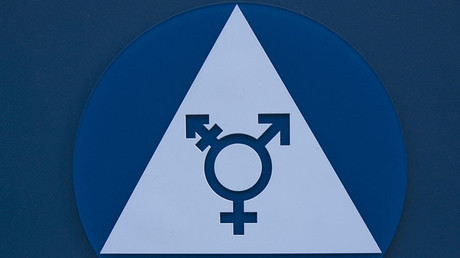Primary schools across Glasgow are introducing unisex toilets to tackle bullying and support children “confused about their gender identity,” the local council has announced.
Under new plans, toilets will no longer be labelled ‘girls’ and ‘boys’, but will instead be labelled ‘unisex’ to tackle anti-social behavior and make LGBT students feel more at ease.
A council spokeswoman was cited on STV as saying: “The toilets in the new builds are a row of individual toilets that can be used by all, and research from other local authorities shows that it can help improve behavior and reduce bullying and vandalism.”
Hillhead Primary School, in the west end of the city, is the first to have implemented the plans with six blocks of ‘floor to ceiling’ toilets for both boys and girls.
David McEwan, the council’s estate program manager for education services, said: “Bullying is reduced, behavior is improved, no graffiti, no soggy bombs on the ceilings.
“It also assists in the LGBT agenda because if we have children even in primary school who are confused about their gender and worry, ‘Do I go to the girls’ toilet or the boys’ toilet?’ well, it doesn’t matter,” McEwan said, according to the Independent.
“It saves a lot of space. New schools cost £3,000 [US$ 3,660] a square meter so we need to make sure we are getting absolute bang for our buck.”
Although the council claims parents and pupils have been consulted on the plans, the announcement of gender-neutral bathrooms has sparked protests among some parents concerned that they could infringe on pupils’ privacy.
Malcolm Balfour, SNP councilor for Drumchapel and Anniesland, said parents had contacted him with “serious concerns.”
While acknowledging that unisex toilets support LGBT pupils, Balfour claimed that they might be problematic in some cases as they undermine privacy.
“I can see that it teaches kids it doesn’t matter what their gender is.
“A girl who feels trapped in a boy’s body and a boy who feels trapped in a girl’s body might feel embarrassed to be going into the ‘wrong’ toilets,” Balfour admitted, as reported on the Independent.
“But girls mature more quickly than boys and they start to develop towards the end of primary school and they need their privacy.”
McEwan defended the plans, however, saying that the toilets would be fully enclosed and bathrooms would only share a row of sinks.
A fully accessible facility will also be built away from the unisex ones in case any issues arise or if someone feels uncomfortable using unisex bathrooms.
In November a school in Leytonstone, east London, announced that it would introduce unisex toilets for pupils over the age of eight.
Buxton School’s head teacher Kath Wheeler welcomed the initiative despite a petition against it being signed by 700 people.
According to the East London and West Essex Guardian, Wheeler said the full-height toilets, which were fully in line with the Department of Education and Waltham Forest Council regulations, would encourage respect among pupils.
Parents though were concerned the new initiative would instead lead to premature sexualization and sexual abuse.
On petition site Change.org, one parent described unisex toilets as “totally disgusting” and said: “There’s already so much child abuse going on and this will increase the situation even more.
“If anything does happen then the headteacher and other associates will be fully responsible. Totally disgusting.”







